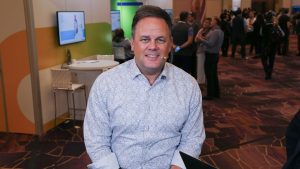Open Compute, hardware + the new homebrew club | #OCPSummit
![]() theCUBE is at the Open Compute Project Summit (#OCPSummit) this week and hardware is at the center of the event. Innovation that took over software in 2013 is finding its way to the hardware side of the equation in 2014. The data center and the cloud will be the big talking points for this year, and in this week’s Best of theCUBE edition we highlight three different segments that focus on innovation and opportunity in the hardware space.
theCUBE is at the Open Compute Project Summit (#OCPSummit) this week and hardware is at the center of the event. Innovation that took over software in 2013 is finding its way to the hardware side of the equation in 2014. The data center and the cloud will be the big talking points for this year, and in this week’s Best of theCUBE edition we highlight three different segments that focus on innovation and opportunity in the hardware space.
New Homebrew Club Led by Alpha Geeks
.
There’s a new paradigm in the valley, focused on hardware excellence. It’s what SiliconANGLE’s Founder John Furrier calls the new, modern homebrew computer club, but for data centers and not PCs. This is the year of the cloud, there’s this new era of data center alpha geeks that are tinkerers and building their own solutions, innovating beyond traditional thinking. The application market is driving this change. As Furrier sees it, software-defined innovation is the future.
“This is causing the cloud to take center stage. This is the year of the cloud,” says theCUBE co-host and Wikibon co-founder Dave Vellante. “I say that because in a hype way, the hype is over. We had the draw of disillusion, but now the meat is on the bone, as we always say. This is the year of the cloud and what is going on under the hood is a technology change around the hardware.” Vellante goes on to make a prediction that more workloads will reside in the cloud (units not revenue) than on-premise.
.
Mark Zuckerberg an alpha geek for the modern data center
Efficiency and incentive. Two words that are littered throughout Mark Zuckerberg’s fireside chat with Tim O’Reilly at the Summit this week. In discussing why Open Compute has been such a success, Zuckerberg points to the communities shared incentive for a cheaper hardware cost at a network level. Those shared incentives include things like the increase of users on the Internet and new revenue opportunities.
“Facebook is a partnership company,” Zuckerberg said. “We’re a social company and a lot of what our product does is help bring people together. And a lot of what we’ve tried to do in our corporate strategy is form partnerships with folks rather than try to do everything ourselves. From a product level, we’ve always had this view that there are going to be way more social products than what we can build ourselves.”
With the growing traction for Open Compute, Facebook saw opportunity (and responsibility) to attempt it on the hardware side, too. They are using the model with Internet.org, Facebook’s initiative to bring affordable or free basic Internet to everyone in the world.
Facebook started, and succeeded, because it was building a product for itself — and Internet.org is a monumental goal to connect the world. Combining smartphones with Internet capabilities into the hands of the underdeveloped world is an initiative packed to the brim with goodwill. That’s not to say Facebook wouldn’t stand to gain a great deal from a more connected planet.
Hardware without workloads is irrelevant
.
In this alpha geek homebrew club, innovation is critical to the open source community, a group that must be free to make its own choices when piecing together the data center of tomorrow. Free markets vs. rigged markets is at the center of many national conversations right now, from government to NSA to open source — there’s a growing swell of chatter around how our rights to the “truth,” or our option to choose, have fallen. Cole Crawford, Executive Director of the Open Compute Foundation believes there is a phenomenal freedom that exists within the open source ecosystems.
theCUBE host Furrier mentions that there’s a lot of controversy going around at the moment, citing the case of Google buses facing protesters and venture capitalists going off the deep end. One thing is certain though, that “innovation comes from community.”
Talking about the notion of free market, Furrier asked Cole Crawford how could rigged market be avoided, inviting him to elaborate on the notions of freedom, free markets, and free choices versus the rigged ones. “How do you manage to keep the magic of innovation from being rigged?”
“Reality television is guided and scripted,” said Crawford, “and a lot of open source movements with the best intentions in the world can end up in a place with traditional business model. As the community grows, as the foundation and the movement grow, the price increases, and all of a sudden you have very wealthy companies contributing to these causes.”
“The most important and strategic position you can have in our own ecosystem is a project-lead position, which is a community elected position. To be a relevant, strategic player in this ecosystem, you have to work on technology. As we maintain that pace of innovation, the community is going to be well-served,” promised Crawford.
A message from John Furrier, co-founder of SiliconANGLE:
Your vote of support is important to us and it helps us keep the content FREE.
One click below supports our mission to provide free, deep, and relevant content.
Join our community on YouTube
Join the community that includes more than 15,000 #CubeAlumni experts, including Amazon.com CEO Andy Jassy, Dell Technologies founder and CEO Michael Dell, Intel CEO Pat Gelsinger, and many more luminaries and experts.
THANK YOU













